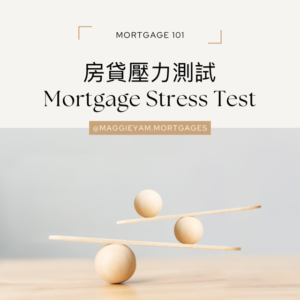Mortgages 101
Fixed vs. Variable rate
 A fixed-rate mortgage locks in your interest rate for the entire term, providing stability. For example, with a five-year fixed-rate mortgage at 5%, you will pay that rate until the term ends.
A fixed-rate mortgage locks in your interest rate for the entire term, providing stability. For example, with a five-year fixed-rate mortgage at 5%, you will pay that rate until the term ends.
Variable-rate mortgage usually offer lower rates initially, but they come with fluctuations. For instance, a 3 year variable-rate mortgage, let say the variable rate is 6.30% (Prime rate 7.2% minus 0.9%). The rate can change based on economic factors and the Prime rates from Bank of Canada. If the Prime rates rise, your payments will increase; If the Prime rates go down, your payments will decrease.
Open vs. closed mortgages

An open mortgage offers more payment flexibility, allowing you to pay down the principal without penalties and even break the contract early. However, this freedom typically comes with a higher interest rate than a closed mortgage, leading in higher monthly payments.
Conversely, a closed mortgage may allow you to make some prepayments towards the loan principal without extra fees. However, if you exceed those limits, you’ll be charged a penalty.
Mortgage Stress Test
 A mortgage stress test ensures you can afford your mortgage even if your income goes down or interest rates rise, guiding your home purchase decisions.
A mortgage stress test ensures you can afford your mortgage even if your income goes down or interest rates rise, guiding your home purchase decisions.
When you apply for a mortgage, the lender will check your ability to make your payments based on the Office of the Superintendent of Financial Institutions (OSFI) minimum qualifying rate (MQR). The current MQR requires borrowers to prove they could qualify for a mortgage at the rate of 5.25% or their contract rate plus 2% – whichever is greater.
Consider a scenario where a borrower is offered a five-year fixed mortgage rate of 5%. They need to demonstrate they can manage their payments based on a rate of 7% (5% + 2%).
To pass the mortgage stress test:
1. Maintain a good credit score.
2. Lower your debt service ratios.
3. Increase your down payment.
4. Choose a longer amortization period.
GDSR & TDSR
 Lenders primarily assess loan eligibility based on two key indicators: GDSR (Gross Debt Servicing Ratio) and TDSR (Total Debt Servicing Ratio).
Lenders primarily assess loan eligibility based on two key indicators: GDSR (Gross Debt Servicing Ratio) and TDSR (Total Debt Servicing Ratio).
GDSR evaluates the percentage of basic housing expenses in relation to gross income before taxes (ideally not exceeding 39%). Basic housing expenses include the principal and interest of the mortgage, property taxes, heat, and strata fees. TDSR assesses the percentage of all debt payments relative to gross income before taxes (ideally not exceeding 44%), including other mortgages, car loans, and credit card balances, etc.
GDSR and TDSR ratios may vary depending on the bank or lending institution. If you have at least a 20% down payment, you can choose to work with a credit union or other lending institutions to bypass the Mortgage Qualifying Rate (MQR) hurdle, thereby obtaining a higher loan amount.
In addition, different banks have various special loan policies such as policies for new immigrants, self-employed individuals, high net worth individuals, etc., which can provide special loan solutions for applicants with insufficient income.
If your TDSR exceeds 44%, we will assist you in analyzing how to restructure your debts. Therefore, it's crucial to communicate thoroughly with professional mortgage experts to help address your loan needs.
Prepayment Penalty
 A prepayment penalty is a fee your mortgage lender might impose if you:
A prepayment penalty is a fee your mortgage lender might impose if you:
- Overpay on your mortgage
- Break the mortgage contract
- Transfer your mortgage to another lender before the term ends
- Pay off your entire mortgage before the term ends, even when selling your home.
The prepayment penalty will usually be the higher of:
1. An amount equal to 3 months’ interest on what you still owe
2. The interest rate differential (IRD)
Assume:
Outstanding mortgage balance: $200,000
Current interest rate: 6%
No. of months left in term: 36 months left in a 5-year term
Current posted interest rate for a mortgage with a 36-month term offered by your lender: 4%
The approximate fees are:
1. Amount equal to 3 months’ interest on what you still owe: $200,000 x 6% x 3/12 months = $3,000
2. IRD: Remaining Mortgage Balance x (Your Mortgage Rate − Current Mortgage Rate) x Remaining Term = $200,000 x (6% - 4%) x 3= $12,000
You have to pay a prepayment penalty of $12,000, which is the higher of the 2 amounts. You may also have to pay an administration fee.
Improving Your Credit Score

One of the key factors in obtaining a mortgage is your credit score. However, building a credit history takes time. To improve your credit score, you can pay attention to the following key points to enhance it:
1. Ensure timely payments for all your bills. If you anticipate difficulties in paying bills, contact the lender immediately.
2. For newcomers to Canada, consider starting with a Secured Credit Card. This involves depositing a certain amount, such as $500, with the bank, and then paying off the card balance each month.
3. Keep the monthly balance below 30%. For example, if your credit limit is $5000 and your average borrowing amount is $1000, your credit utilization rate is 20%.
4. Control the interval between applying for new credit cards or loans. For example, 6 months to 1 year. Avoid applying for credit cards just for the attractive bonus or welcoming points.
5. Try applying for installment payments to enrich your credit history. However, if you plan to buy a house soon, consider that installment payments may affect your mortgage amount. Early repayment does not necessarily help improve your credit score because credit scores mainly consider the payment terms outlined in contracts, and making monthly payments on time is the best practice. Nonetheless, early repayment won't lower your credit score.
6. Apply for credit only when necessary, reduce unnecessary credit inquiries. Understand the difference between "hard" inquiries and "soft" inquiries. "Hard" inquiries are made by entities checking your credit report, such as credit card companies, rental applications, or job applications, and they may affect your score. "Soft" inquiries, on the other hand, are like checking your own credit report, which doesn't impact your credit score.
By implementing these strategies thoughtfully, you can strengthen your credit score and pave the way for a more secure financial future.
